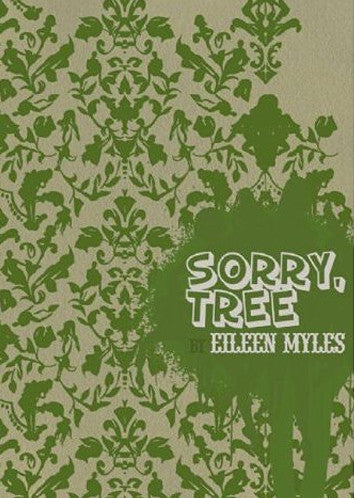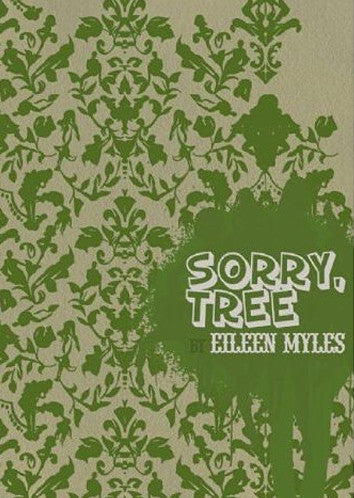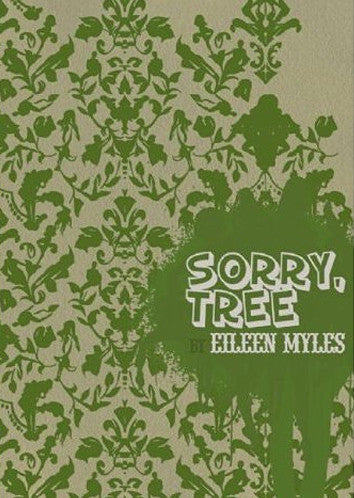
Sorry, Tree
Sorry, Tree
By Eileen Myles
-
I like therapy because I don't need my glasses
I can sit there naked like the animal I am
a beautiful honest animal
Sexy, cool and uncompromising, Myles’ trademark punk sensibility and intimate knowledge of poetic tradition are at work in this eighth collection where every love poem is political and every political poem is, ultimately, about love. Sorry, Tree secures Myles’ eminence as America’s most fearless poet. -
“I think writing / is desire / not a form / of it,” she writes in, “For Jordana,” meditating on the separation of lovers and the marvelously fractured sense of perception this brings to the contents of a “day that’s captured / some way /separately.” These distinctions about writing as something other than form--the extension of one’s perceptive capabilities, perhaps, as a process of apprehension--marks Myles’s work with peculiar insight to the sexual and spiritual presence in words. Such erotic markings bring readers into situations where desire is enacted in the words, rather than formally organized to comment with reflective distance on the broken relationship of lovers. Form certainly exists in Myles’s work, but her writing stresses the process of a discovery in language that is motivated by a willingness to witness desire’s force in words.
Dale Smith, Bookslut
Sorry, Tree is like picking up the phone or an earplug for an iPod or other MP3 device, and listening in on someone talking to themselves instead of you, and yet knowing you’re listening in ... It’s both private and public speech sharing obviously private thoughts and moments mixed with direct address to the reader in a way that is both new and seeped in tradition.
Michael Lally, Lally’s Alley
Like any worthwhile work of art you’ll leave it seeing the world in a deeper, different way. You might even know yourself better.
John J. Geysen, Pop Syndicate
Myles is a poet with a history who writes about history, her personal history and our political history, and how the two intertwine and can't be separated, even if we might want them to.
Kathleen Rooney, Open Letters
Sorry, Tree is a fucking funny title for a book... And especially for a book by Eileen Myles, whose poetry—whether it’s about being lovesick or on a boat full of barfing people or surrounded by conservative zealots—is the opposite of apologetic.
Brendan Kiley, The Stranger
Myles has often included, in her books of "poetry," some sort of prose essay, or manifesto, around which the poems accrete and gain meaning; maybe these prose pieces are also there to detourne the shape of the book, to make it not all poetry, for Myles is a well known despiser of genre's segregations.
Poem Hunter
Eileen Myles's Sorry, Tree achieves a wispy, brilliant blend of the political and personal. She does not shy away from historical subject matter, but she defines it by way of the ordinary day. But make no mistake, the days of a poet of Myles's incisive talent contain nothing ordinary at all. Love, lawn-chairs, death, bad dreams, and September 11th all wind their way through verse at once confessional and driven purely by form.
Meg Hurtado, Verse
Myles’s latest collection of poetry is successful because it showcases the irony, honesty, lyricism, and toughness that have made her, in Dennis Cooper’s words, “one of the savviest and most restless intellects in contemporary literature.”
Beth Lizardo, Kliatt
Sorry, Tree is flat out a terrific book, joining what seem to be the simplest personal poems with a poetic craft that dazzles. It's an aesthetic that sounds like what some part of the School of Quietude would be up to, but Myles takes a tradition that includes everything from Ginsberg to Berrigan to Bukowski to Patti Smith & Lee Ann Brown, and definitely Anne Waldman, Barbara Barg & Elaine Equi, and even Ed Sanders & Paul Blackburn, to forge a writing that comes across simultaneously as effortless & utterly gorgeous.
Ron Silliman, Silliman's Blog
One would be hard-pressed to find a contemporary poet who exemplifies a voice as unique and energetic as that of Eileen Myles. In her latest collection, Sorry, Tree, Myles captures what can only be assessed as truly American visions. Through ultra-keen observation and inimitable poetic gesture, she demonstrates an uncanny ability to construct innovative stories out of single moments and thoughts which might be considered universal in today’s American experience.
Rick Marlatt, Coldfront
Myles’ poems feel as though they were written while moving and they’re good. The poems travel distances in line breaks and between words. The language has a pulse ... there is a restlessness that doesn’t come from uneasiness. No, the restlessness stems from the desire to be doing something/experiencing something new, a desire to turn the everyday into something unique: a single day.
Gina Myers, Octopus Magazine
I missed my stop on the subway, while reading this, I was transported and, perhaps fortunately, not to my intended destination. Instead I visited the spaces that the poet inhabits, which her voice so viscerally describes. I was on a ferry and in a bedroom, within a warm house deep in thought, capturing each minuscule feeling that visited me.
The Brooklyn Socialite
Being able to exist in a book like this means you’re in good shape for just about anything...
Gabriel Ricard, Unlikely Blog -
Eileen Myles was born in Cambridge, Mass. in 1949, was educated in catholic schools, graduated from U. Mass. (Boston) in 1971 and moved to New York City in 1974 to be a poet. Myles quickly became part of the reading, publishing and performance scene in the East Village, editing dodgems in the late 70s and becoming part of the community of St. Mark’s Poetry Project where they studied and were friends with Ted Berrigan, Alice Notley, Paul Violi and Bill Zavatsky. In 1979 they were assistant to poet James Schuyler. Myles was Artistic Director of the Poetry Project in 1984-86. Myles is a vivid interpreter of her own work and travels widely in the US and Canada and internationally giving readings and performances. They are the author of more than a dozen volumes of poetry, fiction, and nonfiction including, Snowflake/different streets (Wave Books, 2012), Sorry, Tree (Wave Books, 2007), Chelsea Girls, Not Me, Skies, The New Fuck You/adventures in lesbian reading, Cool for You, and The Importance of Being Iceland: Travel Essays in Art, and Inferno (A Poet’s Novel) published by OR books and winner of the Lambda Literary Award for Lesbian Fiction. They wrote the libretti for Hell, an opera with music composed by Michael Webster which was performed on both coasts, 2004-2006. They have received a Guggenheim fellowship, a Warhol/Creative Capital art writers’ grant, and the Shelley Memorial Award from the Poetry Society of America. Myles contributes to a wide number of publications including ArtForum, Bookforum, Parkett, and The Believer. They are a Professor Emeritus at UC San Diego where they taught for five years. They live in New York.
Publication Date: April 1, 2007
ISBN# 9781933517209 (5.5x9 96pp, paperback)
ISBN# 9781933517216 (5.5x9 96pp, limited edition hardcover)
Couldn't load pickup availability


